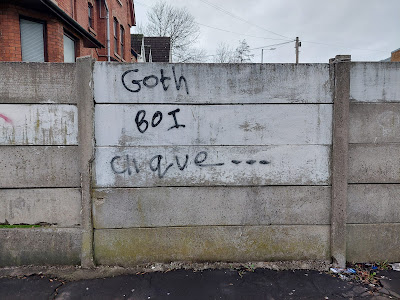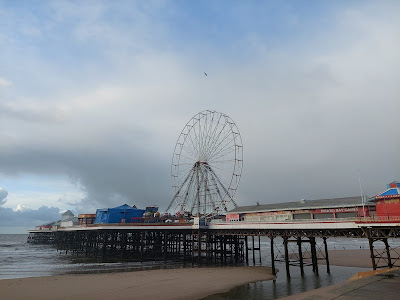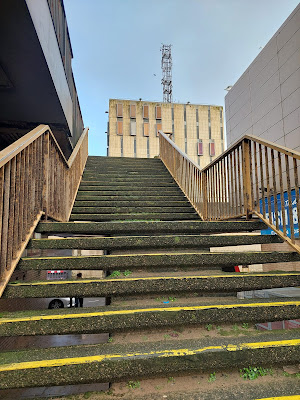Last weekend I heard the second song by the pairing up of John Squire and Liam Gallagher, a song called Mars To Liverpool. I heard the first, Just Another Rainbow, a couple of weeks previously. They both sound like I thought they would.
While out riding my bike on Sunday morning, having just heard Mars To Liverpool before leaving the house, I started thinking about The Second Coming, the second Stone Roses album, the much delayed and highly anticipated follow up to the band's debut five years earlier. I've changed my position on The Second Coming several times and currently think of it as a handful of good songs surrounded by a lot of sub par filler. Tensions that developed during the recording of it broke the band apart, Reni leaving in 1995 and Squire in '96. They stopped talking, rarely in the same room at the same time, four men on four different drugs with no one to tell them how to fix it. I wrote a post here many years ago where I opined that, rather than going too far with The Second Coming, actually they didn't go far enough- they should have created a full on psychedelic rock experience, handed all the tapes over to Future Sound Of London or The Orb and told them to pull it into one seamless piece of music, forty minutes long, the promise of the first few minutes of Breaking Into Heaven (burbling ambient field recordings, fragments of guitar squiggles and studio experiments with Reni's percussion coming in before it breaks into the guitar heroics of the song) turned into the full album, the best bits of the album mixed together in a sonic Stone Roses stew. I still think that could work. But while riding my bike through the lanes of Cheshire I began imaging an alternative history of The Stone Roses, one where they didn't blow it but actually followed through from the high watermark of 1989/90...
... a few weeks after the Spike Island and Glasgow Green gigs in the summer of 1990 Ian, John, Mani and Reni meet and sack manager Gareth Evans. They confront record label Silvertone about the highly restrictive contract they signed a few years earlier. Silvertone boss Andrew Lauder meets his lawyers who advise him the contract is a restriction of trade and very harsh, that a judge will find for the band and he'd be better to cut his losses now. The band settle quickly and start looking for a new label. US giant Geffen have promised millions but wiser heads around the band prevail. 'Forget the money lads', you' ll make money anyway, go for the songs, make the records', friends tell them and for once this most strong-headed and willful of groups agrees. Creation are interested but the band meet Jeff Barrett from Heavenly and like his talk, the promise of complete control and the young Heavenly label's outlook. A few months later The Roses are in the studio and in early 1991 release a 12" single, Ten Storey Love Song, the chiming guitars harking back to the debut but with a more muscular bass and drums backing. The 12" rides high in the chart and a short UK tour in spring '91 sees the group rapturously received by their fans.
By now the weight of recording a second album weighs heavily on them but the recent run of singles- Fool's Gold/ What The World Is Waiting For, One Love and Ten Storey Love Song- shows them a different way to work. 'We're gonna release some singles and EPs', Ian tells the NME, 'one after the other'. Autumn 1991 sees them record another EP, John's predilection for heavy Led Zeppelin style guitars and riffs all over the tapes and songs. Heavenly link them up with Andrew Weatherall and in 1992 an EP of Weatherall produced songs, the Led Zep riffing underplayed now, plus a remix hits the shelves, the chiming 60s psychedelia of the first album now expanded by Andrew's singular remix vision of the early 90s.
Following the success of the EP the band are tight, spending time with each other and enjoying each other's company. Creative juices flow, Ian and John writing together daily. They meet Brendan Lynch, then recording with the about to be reborn Paul Weller and he produces several songs, three of which come out as a 12" in '93. They have side stepped the nascent Britpop stirrings of Blur, Oasis and Suede and now look to expand in other directions, the less tribal, more genre hopping world of the mid 90s pulling them in other musical directions. Ian eases up on the weed, John eases up on stronger stuff, clarity prevails. Hit and run recording sessions, working quickly with different producers is working. They stop overthinking and start enjoying it. A session with Goldie takes Reni's drums to completely new spaces. Heavenly's connections with The Chemical Brothers opens doors and minds and the band spend several weeks in the studio, Ed and Tom flitting between their own sessions and those with The Roses. A stockpile of songs is built up, a four track Chemical Roses EP seeing the light of day in summer 1995, a few weeks before The Chemical Brothers' Exit Planet Dust comes out. Blur and Oasis argue about the number one slot with two average songs, but The Roses are streets ahead, making mid 90s dance/ guitar crossover psychedelia, pushing boundaries as they once did with Fool's Gold. They still miss out on headlining Glastonbury, John breaking his collarbone, cutting short an otherwise successful tour of the US. An invitation to headline Reading the following year is turned down- the group have reverted to their stance of only playing shows on their own terms. 'We don't want to be part of somebody's else's gig', John says, the truculent interview technique of 1989 resurfacing. Instead they do a tour of seaside towns, fifteen dates in the summer of '96, starting in Bridlington, then heading down the east coast and round the south coast, several dates in Wales, and then Blackpool, Southport and Morecambe, ending in Barrow.
In autumn 1996 they spend a few weeks in the studio with Portishead's Geoff Barrow and while not much is achieved two new songs are finished, one a dusty, cinematic trip hop groove, Reni and Mani looped by Barrow. The process of write, record and release 12"s and EPs works, the pressure of recording an album lifted and the band free to follow their noses. In 1997 Steve Hillage produces several sessions and though only a few songs are released everyone enjoys the sessions and the liquid, fluid but focussed psychedelia is well received. Several more songs sit in the vaults.
In 1998, they falter but pick up with a tour of Europe and then record an EPs worth of songs with Mick Jones (The Clash/ BAD), Mick encouraging them to play facing each other, bashing out several songs of loose, ramshackle but melodic guitar pop. John declares that no more than two guitars are on any of the songs, hardly any overdubs and most of the songs sound like the work of a single guitar player. He switches from Les Paul to Telecaster and the thinner sound suits him and the new tunes. Mani helps Primal Scream out with some bass for their Vanishing Point album. In return Martin Duffy plays piano and keys with the Roses and another set of songs are recorded.
As the millennium approaches the group see what they've achieved and eye the new century with a feeling of ten years of success behind them. They record some more songs, the influence of The Beta Band showing, Ian and John and Ian and Reni's occasional combustible disagreements quickly solved by Heavenly's laid back approach to managing the group. Mani and Reni find new inspiration in Neu! and Can and the band hit the studio again, Michael Rother (once a resident of Wilmslow so no stranger to north west England) at the controls. The Roses go kosmische, John playing in straight lines rather than blues, Reni in the motorik groove, his shoulders rolling as he plays.
As New Year's Eve approaches plans are afoot and on NYE 1999 drinkers at Chorlton Irish Club are bemused when a truck pulls up in the afternoon and three men begin hauling gear in. The Stone Roses turn up and begin playing at 8pm, opening with I Wanna Be Adored and then flitting between the songs from the debut album and the dozen single and EP releases since summer 1990. They finish at 9.30pm by which time word has spread and fans are arriving. Packing up quickly they head to Sale and set the gear up again in the scout hut at Raglan Road, the venue where John and Ian first played together as The Patrol in 1980. Simon Wolstencroft is there, manning the door with Cressa. Fans arrive, first come first served, about one hundred packed into the scout hut, sweat already dripping from the walls and ceiling. At 10.30 the band appear and begin to play, shimmering dance rock, motorik grooves, light headed psychedelia, backwards songs, and chorus heavy guitar pop. They finish with a cover of White Riot, John's guitar squealing its last as the clock strikes midnight.
They release their second album the next day. In typically Roses style they mess it up- it's New Year's Day in the year 2000, no record shops are open. When fans finally get the album (unburdened by a heavy and ludicrous name like The Second Coming, it is titled Angry Young Teddy Bears) they find it is a triple disc record. Inside the gatefold is a piece of paper announcing the end of the group. They have nothing more to do. The album contains some of the songs released over the previous ten years and many unreleased from the various sessions, songs recorded with and produced by The Chemical Brothers, Brendan Lynch, Geoff Barrow, Mick Jones, one from a session with Lee Scratch Perry that no one can remember much about, two with Jagz Kooner, several with Steve Hillage and one ten minute epic with Michael Rother. The third disc contains a previously unreleased Weatherall remix from 1991, a Sabres Of Paradise remix from 1996, and a dubby, horn- led Justin Robertson remix. On the final side of the album is a twenty three minute track, the fruits of two different sessions joined together by John Leckie, the first ten minutes the result of a collaboration with Bjork and Graham Massey, John's guitar and Mani's bass and Reni's drums locked in a vaguely 808 style groove, while Ian and Bjork sing a duet. In the second half of the song, Jah Wobble's bass appears and Mani and Wobble trade rubbery basslines, the drums and FX pedals spiraling around, while Ian whispers sweet nothings about space exploration, conquistadors and new centuries. Sinead O'Connor is on backing vocals. The fade out is a long languid groove that could happily go on forever.
A few weeks after the split there are rumours of a series of dates in Scandinavia but nothing happens. All four men are seen together socially, friends still and happy to leave the music industry behind, having achieved what they set out to- play gigs, make records, look good, give journalists a tough time in interviews, do it on their own terms. After all of that, from the halcyon days of 1989 when they broke through, and their constant desire to keep reinventing their sound through to 1999, there's nothing left to do, nowhere left to go- they've done it all.
Breaking Into Heaven


























